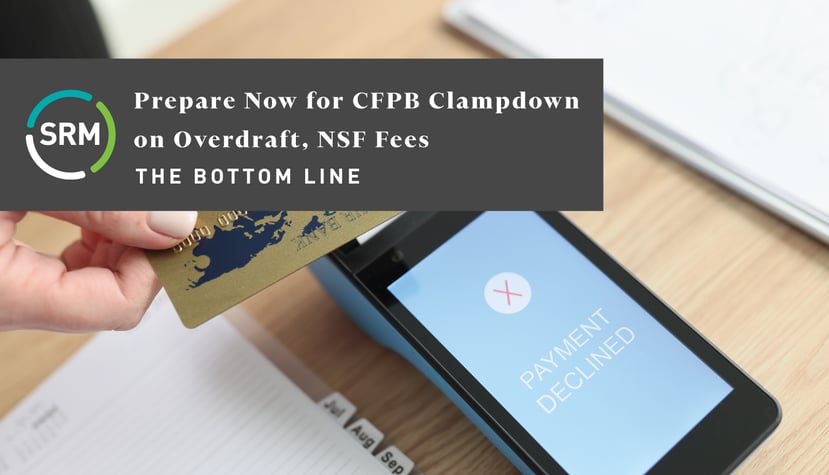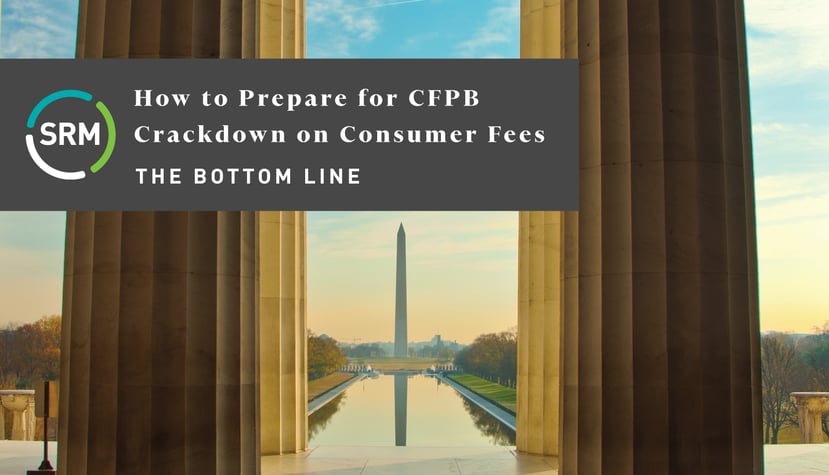
With success comes additional scrutiny. A recent Federal Reserve survey indicates that three-quarters of Americans are familiar with Buy Now Pay Later (BNPL) services, and nearly 10% had accepted such a deferred payment offer in the past 30 days. A modernized take on installment lending for the digital age, BNPL's rapid rise has attracted the attention of lawmakers, regulators, and companies with various stakes in the payments ecosystem.
Read More
Topics:
Apple Pay,
Chase Pay,
Buy Now Pay Later,
BNPL,
CFPB,
Consumer Financial Protection Bureau,
Bank Regulation,
Credit Union Regulation

The landscape of US financial regulation is continually evolving. At the heart of this transformation is the Consumer Financial Protection Bureau (CFPB), an agency tasked with overseeing and enforcing consumer protection laws within the financial sector.
Read More
Topics:
Technology,
Regulations,
CFPB,
Consumer Financial Protection Bureau,
Financial Institutions,
Data Protection

The CFPB has proposed a rule to limit overdraft charges at larger U.S. banks and credit unions – though financial institutions of all sizes should take note.
Read More
Topics:
Vendor Contract Negotiation,
Bank Vendor Management,
Credit Union Vendor Management,
Fee Income,
CFPB,
Regulation,
Overdraft Fees,
NSF Fees,
Service Charges
![Breaking-Down-Concerns-CU-Leaders-Blog-Image_FNL[78]](https://blog.srmcorp.com/hs-fs/hubfs/Breaking-Down-Concerns-CU-Leaders-Blog-Image_FNL%5B78%5D.jpg?width=829&height=476&name=Breaking-Down-Concerns-CU-Leaders-Blog-Image_FNL%5B78%5D.jpg)
It’s an understatement to say that 2023 has been demanding for credit unions.
A flurry of interest rate hikes has created balance sheet challenges. The recent failures of two large banks, and the voluntary liquidation of another, have created questions about the public’s underlying confidence in the financial services industry.
Read More
Topics:
Digital Banking,
Vendor Contract Negotiation,
Bank Vendor Management,
Credit Union Vendor Management,
Deposits,
CFPB,
Overdraft Fees

It’s not every day that a phrase as vague and slanted as “junk fees” becomes an actual legislative term, but here we are. In various statements, the White House and the Consumer Financial Protection Bureau (CFPB) have defined junk fees as “hidden or unexpected fees” and “increasingly sophisticated tools to disguise the true price consumers face.”
Although President Biden highlighted hotel resort fees, concert ticket services, and airline surcharges in his State of the Union address, the CFPB has also pushed to lower the cap for most credit card late fees from roughly $30 to $8. Limiting or eliminating NSF/overdraft fees is also high on the agency’s agenda.
Read More
Topics:
Vendor Contract Negotiation,
Bank Vendor Management,
Credit Union Vendor Management,
Overdraft,
CFPB,
Credit Cards,
Retail Banking
![CFPB-WP-Blog-Image[30]](https://blog.srmcorp.com/hs-fs/hubfs/CFPB-WP-Blog-Image%5B30%5D.png?width=829&height=475&name=CFPB-WP-Blog-Image%5B30%5D.png)
Shifts in the regulatory landscape carry significant impacts on banks, credit unions, and the fintech companies that are part of a growing ecosystem. The most-active agency in recent months has been the Consumer Financial Protection Bureau (CFPB). There's little reason to expect the CFPB to slow its pace in 2023, aggressively enforcing existing rules and angling to expand its jurisdiction.
Read More
Topics:
Open Banking,
Fintech,
Vendor Contract Negotiation,
Bank Vendor Management,
Credit Union Vendor Management,
BaaS,
CFPB
![SRM-Sept2022-BlogImage_Updated[6]](https://blog.srmcorp.com/hs-fs/hubfs/SRM-Sept2022-BlogImage_Updated%5B6%5D.jpg?width=1600&name=SRM-Sept2022-BlogImage_Updated%5B6%5D.jpg)
Banks and credit unions interested in offering Buy Now, Pay Later (BNPL) services should be pleased with the latest report from the Consumer Financial Protection Bureau (CFPB).
Many FIs have been reluctant to dive into the popular consumer offering, largely due to uncertainty over the regulatory environment. SRM asserted in a recent report that banks and credit unions have the experience and tools necessary to handle regulatory scrutiny.
Read More
Topics:
Payments,
Vendor Contract,
Buy Now Pay Later,
BNPL,
CFPB,
Credit Cards

The first half of 2022 was eventful for banks and credit unions, and there’s no reason to expect the pace to slow. Financial institutions must monitor changes to the payments ecosystem while simultaneously dealing with rising interest rates, eroding consumer confidence, and potential cracks in credit quality.
Here’s a quick summary of what the team at SRM sees as the key trends in financial services and how these trends might play out over the balance of the year.
Read More
Topics:
Payments,
Cryptocurrency,
Digital Assets,
Overdraft,
BNPL,
CFPB
![Card-Act-Blog-Image[28]](https://blog.srmcorp.com/hs-fs/hubfs/Card-Act-Blog-Image%5B28%5D.png?width=829&name=Card-Act-Blog-Image%5B28%5D.png)
Two recent developments are sending a message to credit card issuers that the regulatory and political winds are not blowing in their favor.
Rohit Chopra, director of the Consumer Financial Protection Bureau (CFPB), on June 22 issued an advance notice of proposed rulemaking to assess if late fees charged by credit card issuers are “reasonable and proportional,” as required by the Credit Card Accountability Responsibility and Disclosure (CARD) Act.
Chopra’s notice came weeks after longtime card industry adversary Sen. Richard Durbin chaired a Judiciary Committee meeting exploring “excessive interchange fees.” While Durbin advocated for reforms, some of his suggestions would set the industry back by decades, likely ending the ability of small banks and credit unions to offer credit cards and directly harming consumers.
Though the outcome is uncertain, the trajectory is clear. Now is the time for a refresher course on the current rules of the road and for issuers to prepare for any potential changes arising during this period of heightened scrutiny.
Read More
Topics:
Durbin Amendment,
CFPB,
Credit Card Fees,
CARD Act,
Dodd-Frank Act,
Consumer Financial Protection Bureau
![Blockchain-Blog-Image[13]](https://blog.srmcorp.com/hs-fs/hubfs/Blockchain-Blog-Image%5B13%5D.png?width=1600&name=Blockchain-Blog-Image%5B13%5D.png)
While a number of financial institutions remain cautious about cryptocurrency, many use the underlying technology for other purposes.
The up-and-down swings of digital assets, and an uncertain regulatory climate, have kept a fair share of banks and credit unions on the sidelines. At the same time, FIs have shown a willingness to embrace distributed ledger technology (DLT) ahead of the volatile crypto market.
Read More
Topics:
Fintech,
Blockchain,
Credit Union Vendor Contracts,
Bank Vendor Contracts,
CFPB,
Distributed Ledger Technology



![Breaking-Down-Concerns-CU-Leaders-Blog-Image_FNL[78]](https://blog.srmcorp.com/hs-fs/hubfs/Breaking-Down-Concerns-CU-Leaders-Blog-Image_FNL%5B78%5D.jpg?width=829&height=476&name=Breaking-Down-Concerns-CU-Leaders-Blog-Image_FNL%5B78%5D.jpg)

![CFPB-WP-Blog-Image[30]](https://blog.srmcorp.com/hs-fs/hubfs/CFPB-WP-Blog-Image%5B30%5D.png?width=829&height=475&name=CFPB-WP-Blog-Image%5B30%5D.png)
![SRM-Sept2022-BlogImage_Updated[6]](https://blog.srmcorp.com/hs-fs/hubfs/SRM-Sept2022-BlogImage_Updated%5B6%5D.jpg?width=1600&name=SRM-Sept2022-BlogImage_Updated%5B6%5D.jpg)

![Card-Act-Blog-Image[28]](https://blog.srmcorp.com/hs-fs/hubfs/Card-Act-Blog-Image%5B28%5D.png?width=829&name=Card-Act-Blog-Image%5B28%5D.png)
![Blockchain-Blog-Image[13]](https://blog.srmcorp.com/hs-fs/hubfs/Blockchain-Blog-Image%5B13%5D.png?width=1600&name=Blockchain-Blog-Image%5B13%5D.png)


